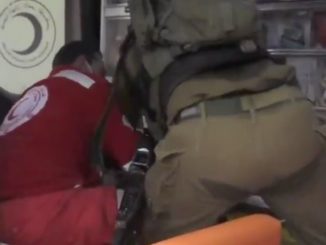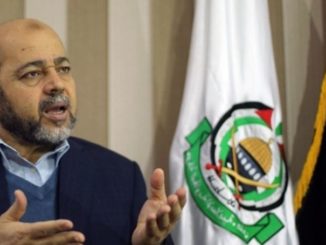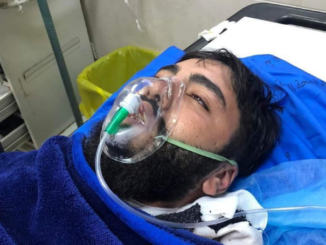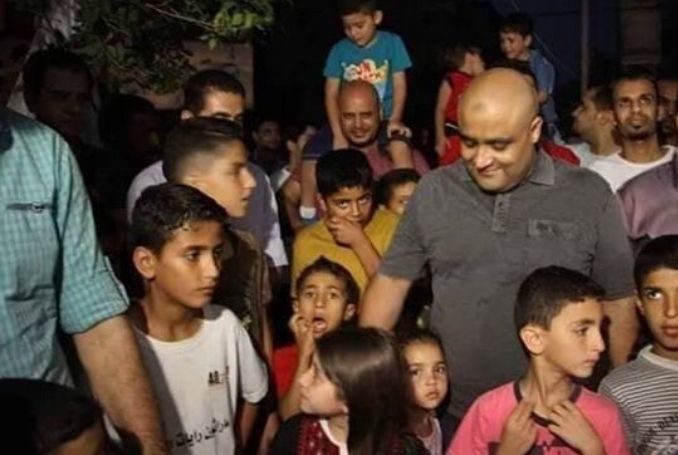
Mohammad al-Halabi – speaking from an Israeli prison and through his lawyer, Jonathan Kuttab, who helped coordinate the interview – shares his experience of Israel’s harsh legal and judicial system.
Mohammad al-Halabi – speaking from an Israeli prison and through his lawyer, Jonathan Kuttab, who helped coordinate the interview – shares his experience of Israel’s harsh legal and judicial system.
Despite a woeful lack of evidence, Palestinian humanitarian and former World Vision aid worker, Mohammad al-Halabi, was convicted by an Israeli court last year for financially supporting anti-Israeli terrorism.
He was arbitrarily apprehended and imprisoned much earlier in 2016, from which time he has been subjected to Israeli torture, abuse, intimidation, and deprivation of life necessities and medical treatment. During the same period, he was presented to Israeli courts on numerous occasions, though always prevented him from seeing the “evidence” against him and to which only the Israeli state and judges were privy.
Additionally, in and outside the courts, al-Halabi was often pressured to confess to false charges that, on the one hand, would satisfy Israel’s desire to undermine the credibility of charitable organizations helping Palestinians in need and, on the other, reinforce the deeply troubling and racist stereotype that Palestinians are terrorists, even those like al-Halabi who are not only law-abiding but committed to alleviating the plight of the poor.
In this TRT World exclusive, al-Halabi – speaking from an Israeli prison and through his lawyer, Jonathan Kuttab, who helped coordinate the following interview – shares his experience of Israel’s harsh legal and judicial system, as well as what he believes the international community can do to help ensure justice for Palestinian political prisoners like himself.
What, generally, have the last number of years been like for you, since Israel forced you away from the humanitarian work you were doing in Gaza?
MOHAMMAD AL-HALABI: I would describe it as a journey of suffering. One of course that lasts till this day as I remain in prison for having been convicted on false charges.
The journey began in June 2016. While I was overseeing relief programs helping Palestinians, I was suddenly arrested by Israeli authorities. It was only two days after I started work as the operations and general manager of World Vision’s Jerusalem office.
During my way back to Gaza, I was detained by the authorities while crossing the Erez (Beit Hanoun) Crossing between [the blockaded territory] and Israel. From there I was taken for an interview with Israeli intelligence.
I remember being asked to wait when we got to the interview location. Between then and the start of the actual interview was well over an hour. During this time I called my wife to make arrangements for celebrating her birthday – the next day, June 16.
At that moment I had no fears of any kind because I was confident about my life circumstances, both personally and professionally. I’ve never partook in illegal activity that could cause me serious trouble with any party – Israel, the Palestinian Authority, what have you.
When I was finally interviewed, Israeli authorities asked me questions about the nature of World Vision’s projects and programs. I answered them but they informed me that I would be transferred to an interrogation centre in Ashkelon. By this point I was exhausted; it was the month of Ramadan and I was fasting all day. At 9 PM I was transferred to the center.
Could you describe your initial interrogation by Israel?
MA: It began around 11 PM the same day. After a thorough body search of me, the chief investigator claimed that international organizations in Gaza, especially World Vision, hamper the effectiveness of the Israeli blockade on Gaza – particularly through their humanitarian interventions.
They admitted that I was arrested to discipline international institutions and force them to stop those programs. They figured they could do that by keeping program personnel busy defending themselves against baseless accusations, rather than addressing Israeli violations in Gaza and, more broadly, the illegally occupied Palestinian territories.
Israel also sought to punish me for my international visits and meetings with prominent officials and media, where I discussed Israeli crimes and human rights violations against the Palestinian people. Officials at the interrogation demanded I confess that World Vision financially and materially supported Palestinian factions. I refused.
Throughout the interrogation I was prevented from accessing or meeting with a lawyer. Instead the officials questioned me for at least 20 hours. I thought there’d be no questioning after that but the grilling shortly after resumed. In total I was interrogated for 96 hours – without much interruption. A four hour break followed and then there was even more questioning.
115 Court Appearances and Counting: Father of ‘Humanitarian Hero’, Mohammed Al-Halabi Speaks out
Are you able to break down the stages in which such a protracted interrogation occurred and perhaps what each involved?
MA: The interrogation itself was conducted in three stages.
Stage one involved psychological pressure. Israeli officials threatened to prevent my sister from traveling to Jerusalem for medical treatment and to also prevent my mother from traveling to the (occupied) West Bank for the same. On top of that they threatened to kill my children and demolish my house in any future escalation of violence between Israel and Palestine.
They said they’d cover this up by telling the public that this was a security measure Israel had to take to defend itself from ‘Palestinian terrorism’. Additional psychological pressure came from their hinting they would randomly arrest my wife.
Stage two involved intense physical torture. I was dragged into a small room with walls already stained with blood. There I was beaten on my head and chest, my head was slammed against the wall several times. The officials demanded that I confess to fabricated charges. Again I refused.
It’s worth mentioning that a Red Cross representative visited me in my cell during this stage and witnessed signs of torture on my body. She said she would contact Israeli authorities to stop the physical torture. The next day there was a court session for me and I informed the judge, to no avail, that I was being subjected to torture.
In stage three, when they realized that the stick was not effective, they tried offering a carrot. They presented a deal in which I would accuse World Vision of inciting employees against Judaism, and supporting terrorism in Jenin. They also wanted me to accuse organizations like Oxfam, Save the Children, Catholic Relief Services, and CHF International of supporting terrorism in Gaza and promoting antisemitism.
They told me that this confession would remain confidential, such that my name would not be mentioned, and that I would be detained for a maximum of nine months. They promised to assist me in establishing my own business and obtain a high-ranking job at the UN.
I adamantly refused for the third time, which angered them further. They told me that they would prepare a serious indictment and manufacture a public scandal against me and World Vision. They claimed that no one would dare support me; World Vision, the Palestinian Authority, even my family would abandon me. I would confess to what they wanted then, they said.
In the end they filed imaginary charges against me, based on the lie that I – a humanitarian worker – was helping fund terrorism. That garnered a great deal of media attention. Israel however underestimated the extent of support I’d receive for my case. They failed to predict who would stand by me.
3 Years and No Conviction: Al-Halabi Remains on Trial in an Israeli Court
Why, in your view, did Israel imprison you so long, even before you formally receiving a 12-year sentence from an Israeli court in 2022?
MA: I didn’t go along with what Israel wanted. From 2016 Israel forced me to endure deliberate procrastination. Their aim was to exhaust me physically and mentally, till I gave in to their demands. Largely because I never did, I’ve been arraigned in Israeli courts more than any Palestinian prisoner – totaling over 150 sessions.
Getting to the courts involved me being forcibly transported in a vehicle known as the “buscat” – an iron cage-like vehicle resembling a coffin. Perhaps not ironically that was part of the greater effort by Israel to kill my spirits, much as they claimed that transporting me this way was a “mistake”. I rode the buscat every four days, spending more than 60 hours inside it with my hands and feet bound. I became the most frequently transported Palestinian prisoner in it as well.
In each court session, a new deal was presented in which I would confess to fabricated charges in exchange for my release, after a certain period of imprisonment. It started with 17 months, then two years, then three years, and so on, depending on the time I had already spent.
However, I persistently refused, despite threats made by the prosecution and judges who warned that if I didn’t agree to the deal a harsh sentence – based on a secret file – would be issued against me. And that’s exactly what they did.
During my imprisonment I visited the prison clinic seeking treatment for my hearing, which had been impaired by 40 percent. This was specifically due to the blows to my head and ears I received during the torture. However, the clinic refused to document the cause and delayed my treatment. Eventually they provided me with some that proved ineffective, saying, “This is all we have”.
What was your experience of Israeli authorities when they were not directly interrogating you?
MA: They handled me with excessive rudeness and violence, whether outside the cell or in the buscat. I was threatened with physical assault if I spoke to the press in court and when I did they isolated me in a cell lacking the basic necessities of life, without a mattress or blankets.
Like thousands of Palestinian prisoners, I’ve been living in dire circumstances characterized by a shortage of food, spoiled vegetables, a lack of hot water for bathing, continuous harassment, and searches. To help end this the international community should put stronger pressure on Israel to recognize Palestinian prisoners as prisoners of war, according to Geneva Conventions.
The international community should apply the same kind of pressure on Israel to release the prisoners themselves – starting with the dozens of detained children, women, and sick persons and then proceed with others.
Two years before my arrest Israel began tightening the siege on Gaza by arresting business persons and halting imports to Gaza. This was under the pretext of dual-use items, claiming that Hamas benefited from these materials. In reality, Israel’s focus was on curbing the interventions of international institutions and stopping their assistance to increasingly suffocate Gaza residents.
Through my case, I learned about the complicity and collusion of the Israeli judiciary with the security apparatus. In 2016, during my first trial session, I heard the judge say to an Israeli lawyer, “None of them comes to court innocent” – referring of course to Palestinians. In my view this indicates the judiciary is an executive tool for Israeli intelligence, in their larger effort to misframe Palestinians.
Moreover, during the course of my trial sessions I discovered that the term “humanitarian work” means nothing in the Israeli dictionary; Israel only believes in the policy of power, subjugation, killing, destruction, accusing Palestinians of crimes to achieve its unjust political goals.
How do you think Israel, if called upon to do so right now, would attempt to justify your wrongful conviction?
MA: As I alluded to earlier, they’d cite a “secret file” that they typically avoid discussing altogether. It’s no surprise given the fraudulent nature of the conviction and, more specifically, that the file relies on an undisclosed “collaborator’s testimony”.
He made the claim – a fabrication produced in conjunction with Israeli operatives – that I confessed to all the charges against me. This is something I repeatedly refuted, when called to account for it by Israeli intelligence agencies and judges.
Not so strangely, they refused to acknowledge any of this publicly and relied on the testimony to implicate me – despite how it clearly contradicted material evidence and the fact that the collaborator had criminal precedents in Israel, including one for providing false testimony to the police.
They also relied on his testimony while dismissing my complaint of torture, especially after the Red Cross’s refusal to provide my lawyer with a report of what they saw. These actions are so outrageous they’d make even ruthless mobsters cringe.
How do you see your predicament within the larger context of Israeli oppression?
MA: It’s my belief that Israel wants is to find any kind of circumstantial information that it can use to threaten, demonize, curtail the actions of international institutions, as well as blackmail them with a file – made from the information – at any moment, be it in their so-called “legal system” or more publicly if they speak about Israel’s crimes against civilians.
In my case specifically, Israel sought to falsely expose World Vision, represented by me, as supporting terrorism against the state. Among other things this would be embarrassing for countries like Germany, the UK, Canada, the US, and Australia that generally have good relations with World Vision and so don’t want to be viewed as friends with the “enemy” – let alone one that’s “antisemitic” in virtue of simply being antagonistic towards Israel.
Given my prior awareness of Israel’s dishonest intentions from the moment of my arrest, I have rejected any “deal” it has offered me. Instead I have opted to contest Israeli intelligence and the Israeli judiciary. To this day, I challenge them to find any violation in my work with World Vision or to prove any direct or indirect support, deliberate or unintentional, to any violent Palestinian faction. I also ask the international community to show more courage in pressuring Israel to heed the voice of truth and release me.
That partly involves democratic governments, in keeping with the universal principles they claim to uphold, vindicating me as a victim of malicious Israeli falsehoods and compel Israel itself to adhere to the same principles. The findings of forensic audits by World Vision and the Australian Department of Foreign Affairs and Trade lend themselves to this, as they confirm I never diverted funds to support terrorism.
What justice is there in punishing me for that?
This interview was originally published in TRT World and was contributed by the author to The Palestine Chronicle.
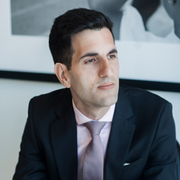
– Paul Salvatori is a Toronto-based journalist, community worker and artist. Much of his work on Palestine involves public education, such as through his recently created interview series, “Palestine in Perspective” (The Dark Room Podcast), where he speaks with writers, scholars and activists. He contributed this article to The Palestine Chronicle.


